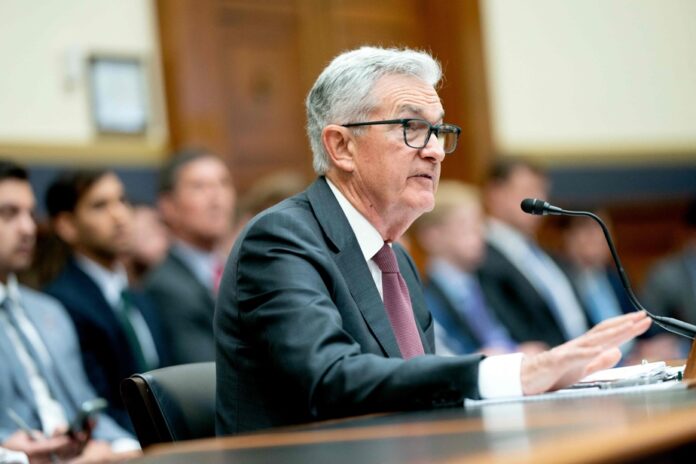(Washington) The pause in interest rate hikes marked by the Fed last week may only be temporary: Fed Chairman Jerome Powell warned again on Wednesday that one or more additional hikes were to be expected, at a slower pace than before though.
“Given how far we’ve come, it may make sense to raise rates, but do so at a more moderate pace,” the chairman of the US Federal Reserve said during his hearing before a committee of the US House of Representatives. .
Because, while inflation has slowed since its peak a year ago, it remains far too high.
“Virtually all” officials of the Federal Reserve’s Monetary Policy Committee “expect it to be appropriate to raise interest rates somewhat further by the end of the year,” he said. he still indicated. With “a large majority” in favor of two increases.
On June 14, the Fed marked a pause in its key rate hikes, for the first time since March 2022, and after 10 hikes, by 5 points in total. Rates are now in the 5-5.25% range.
This is to “assess the information and its implications for monetary policy,” Powell said.
The next Fed meeting will be July 25-26.
The rate hikes, which lead commercial banks to increase the cost of their loans to households and businesses, aim to slow down economic activity, in order to ease the pressure on prices and slow down inflation.
This remains “well above our long-term 2% target,” the Fed Chairman said. “We still have a long way to go, but we are making progress,” he then qualified.
Wages have risen sharply in the United States, as the lack of labor pushes employers to offer better conditions to attract candidates and retain their staff. But “inflation is so high it’s swallowing up wage increases,” the Fed chairman said.
However, he cautioned, “reducing inflation will likely require a period of below-trend growth,” Powell further cautioned.
While Jerome Powell was heard by elected House of Representatives, senators conducted the hearing of the three people chosen by President Joe Biden for the posts of Vice President and Governors of the Fed.
The three economists were notably questioned on the risks associated with too much concentration in a particularly turbulent banking sector since the fall of Silicon Valley Bank in early March.
“We like the fact that there is a diversity of banks in the economy and we wouldn’t want too much consolidation,” said Philip Jefferson, one of the Fed governors chosen to become number two.
The American banking landscape is indeed composed, alongside the large establishments with internationally known names, of a multitude of small local or regional banks, the local banks.
“I think diversity in the banking industry is key, competition in the banking industry is key,” said Adriana Kugler, currently one of the senior officials at the World Bank who could become the country’s first governor. Fed Hispanic.
This competition in the banking sector is, according to her, “one of the factors that allow low- and modest-income households to have access to credit. […] I fear excessive consolidation”.
Lisa Cook, who has served on the board of governors for a year and has been appointed for a full term, even believes that, on the regulatory side, retail banks “should not be burdened with the same requirements as the big banks and that ‘they should be able to thrive in these communities without the burden of significant regulation’.
“Banking concentration is a risk to financial stability,” she warned.
These three appointments, of African-American and Hispanic economists, should make it possible to bring more diversity to the Fed. They must now be validated by the Senate.















